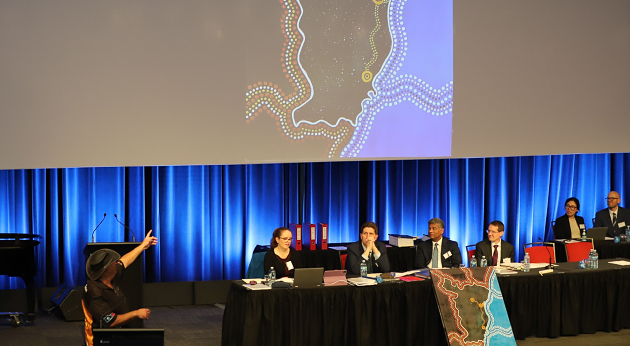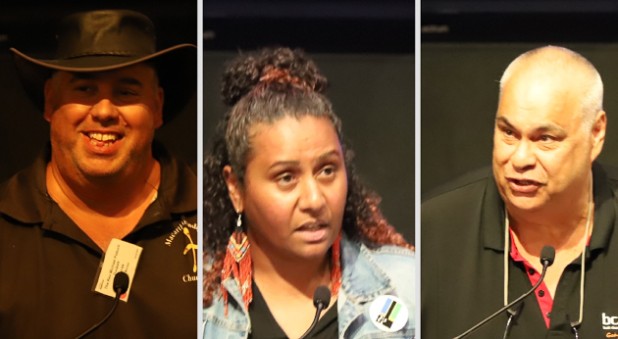Three Indigenous Anglicans addressed Synod on its first evening in a special presentation on the Voice to Parliament.
The aim was not to advise members how to vote in the October 14 referendum, but to provide reflections and observations about the Voice and Indigenous reconciliation.
The pastor of Macarthur Indigenous Church, the Rev Michael Duckett, sought to explain the difference in views between many Indigenous and non-Indigenous people by using a bus as a metaphor.
“Government has put the bus together and they’ve put the Voice on the side because they thought that would solve our problems,” he said. “Many in Australia are looking at the bus saying, ‘Who’s the bus driver? How many seats are in that bus? Is it registered? Does it have good tyres? And has it got seatbelts? They want to know all the details about the bus. And that’s fair enough. Because when I look at this proposal, I’ve seen better chook raffles!”
However, Mr Duckett added that because many Indigenous men and women had seen very little change in their circumstances over the years, “you’ll see some of my people sitting at the next bus stop going, ‘Well, here comes a bus. It’s moving!’ They don’t care if it’s registered. They don’t care how many seats are on that bus. They don’t even care who’s driving it sometimes. They’re just saying, ‘There’s a bus coming and it’s moving to improve things for my people. I’m getting on board’.
“ ...talk about the Voice all you like but may God encourage us, stir our hearts, to spend that same amount of time talking about the spread of the gospel among my people.”
“Is my hope in that? No. My hope is in Christ Jesus. After the referendum and the vote, will it change my world when I get up in the morning? No... but Jesus changed my life. He changed my family’s life.
“So, talk about the Voice all you like but may God encourage us, stir our hearts, to spend that same amount of time talking about the spread of the gospel among my people... vote as God leads, and that’s between you and God. But more importantly, put your efforts, your prayers into the spread of the gospel among my people here so the Sydney Diocese can showcase to the world what it means to be reconciled to the First Nations peoples through Christ Jesus.”
 The Rev Michael Duckett points to a painting representing Indigenous work in the Sydney Diocese.
The Rev Michael Duckett points to a painting representing Indigenous work in the Sydney Diocese.
An Indigenous lay representative from Glebe, Larissa Minniecon, who confirmed she planned to vote “Yes” in the referendum, raised the question of how God’s people in Sydney could collectively commit to Psalm 89’s steadfast love and faithfulness if they wanted to see justice for Indigenous people.
She spoke about Jesus and the woman at the well in John 4, and the “transformative change” offered by Jesus’ gift of living water.
“Today, the position of truth-telling and the Church is one of the most important roles we need in our communities, for First Nations Christians see our wells of living water running dry,” she said, adding: “I believe that the Voice is a gift to the Australian people, but truth-telling is a gift for the churches. How and what that looks like is up to us to design together. If we create wells [so that] my people will feel safe, nourished and elevated, then we can create catalysts for our communities.”
“The Bible is the only source of true reconciliation”
The national indigenous officer of Bush Church Aid, the Rev Neville Naden, said he wasn’t intending to advocate for either referendum position but talk instead about “what our core business is as the Church... to proclaim Christ, him crucified, buried, risen and coming again. Because that’s where hope lies”.
In considering reconciliation, he said: “In 2 Corinthians 5, verses 18-20, we have what I believe is the prescription for a reconciliation that does work... It doesn’t come from two parties sitting down and discussing how they can be one. It doesn’t involve a council saying what will or what won’t work for bringing people together as one. It doesn’t come from enshrining an Indigenous Voice in one of the founding documents of this country.
“The Bible is the only source of true reconciliation that exists today. Why? Because it totally removes the motives of the human desire and the human heart. And it replaces it with God. Reconciliation begins with God.”
Highlighting New Testament examples of disagreements and disunity between Paul and Barnabas – and between Jesus’s disciples – to show how one could be reconciled to God without being united, Mr Naden said, “don’t think for a minute that reconciliation means unity... It’s when we see ourselves in terms of our sin and God reaches down by his grace and chooses to do a work of grace in our lives. My friends, that’s the reconciliation that we are to be working towards.”
He urged Synod members not to become distracted from doing God’s work of reconciliation. “There are plenty of people outside the church that can work towards a secular reconciliation that leads to better jobs and so forth and so on. And that’s important, don’t get me wrong, but our core business is that biblical model of reconciliation.”
He added that “the other thing that’s underpinning the Voice is the notion of sovereignty. My people go around and they say, ‘Well, we haven’t ceded sovereignty’. My friends, we never had sovereignty. No one has sovereignty. God doesn’t give his sovereignty to anyone... He gives custodianship and stewardship to people. And it’s a healthier understanding of those two things that’s underpinning this Voice. That’s what’s needed in this space.”






















